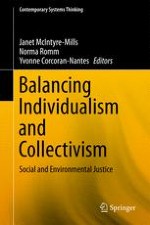
2018 | OriginalPaper | Buchkapitel
1. Foregrounding Critical Systemic and Indigenous Ways of Collective Knowing Toward (Re)Directing the Anthropocene
verfasst von : Norma R. A. Romm
Erschienen in: Balancing Individualism and Collectivism
Aktivieren Sie unsere intelligente Suche, um passende Fachinhalte oder Patente zu finden.
Wählen Sie Textabschnitte aus um mit Künstlicher Intelligenz passenden Patente zu finden. powered by
Markieren Sie Textabschnitte, um KI-gestützt weitere passende Inhalte zu finden. powered by